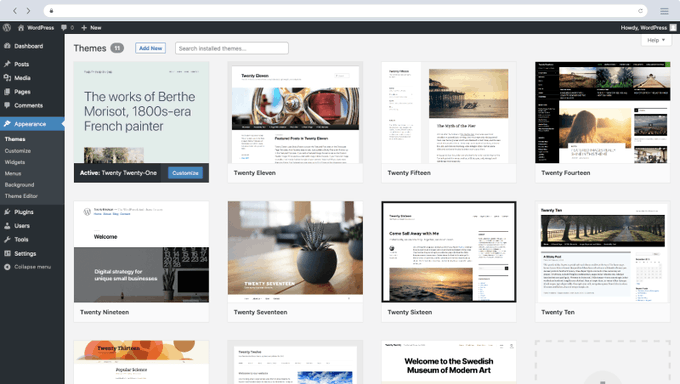
1. WordPress
WordPress is perhaps the best CMS without a doubt. It’s the world’s most popular CMS software, and it powers around 43% of all websites on the internet. Its ocean of plugins and themes creates endless possibilities for your website.
2. Joomla
Joomla is also a very popular CMS that powers 2% of all websites on the internet. However, it’s really an ideal CMS platform for developers and experienced website creators, so it’s not such a good option for beginners.
3. Drupal
Drupal is a good option for developers, or for people able to hire a developer. It’s especially good if you’re aiming to build a highly customized site that needs to handle a lot of data.
4. Ghost
Ghost is a CMS platform specifically designed for bloggers. Ghost doesn’t offer the same amount of power and flexibility as WordPress but is still more than enough to get started for beginners.
5. Magento
Magento, now Adobe Commerce, is one of the best eCommerce platforms out there. The CMS software focuses on security, SEO, and customization to optimize all types of eCommerce sites.
https://business.adobe.com/products/magen-commerce.html
6. PrestaShop
PrestaShop is another popular CMS platform for small to medium-sized eCommerce businesses. Its active community and broad set of features make it a highly flexible online store management platform.
7. Blogger
Blogger has been around since 1999 and as the name suggests, it is more inclined towards bloggers. It is offered by Google and is completely free to use. It requires the least effort to set up and get running.
8. Shopify
Shopify is an all-in-one e-commerce CMS that requires no technical knowledge to get running. You need to buy hosting, install any software, or manage updates or backups. if you wanna quickly start selling, Shopify should be your go-to place.
9. BigCommerce
Kinda like Shopify, BigCommerce is also an all-in-one e-commerce CMS solution. They host your website for you, provide you with a CMS, as well as manage security, updates, and backups.
10. Textpattern
Textpattern is a simple and straightforward CMS platform that has been around since 2003. It is relatively unknown, so you might face trouble finding freelancers who work with it these days.
11. Magnolia
Magnolia is an open-source, headless CMS that is built on top of Java, thus providing extreme reliability and stability. It is often used in high-level enterprise applications.
12. Sitefinity
Sitefinity is another powerful CMS that is used on high-traffic websites that has fast-paced actions. Most recently, the World Health Organization migrated to Sitefinity in 2020 to deliver important health data more efficiently.
13. Sitecore
Sitecore is a leading enterprise CMSs that is built on top of ASP. NET. Sitecore’s flex is that it integrates more marketing tools than other popular CMS platforms. It is used by Huawei on its official website.
14. Hubspot CMS
HubSpot CMS is one of the top options to create a website without the need for constant updates and edits. It’s perfect for beginners and lets beginners publish a website without technical knowledge.
15. Grav
Grav is a file-based CMS platform that takes minimal server space and resources. Its non-traditional database makes the platform lighter and faster than other CMS software. It however isn’t much beginner-friendly.